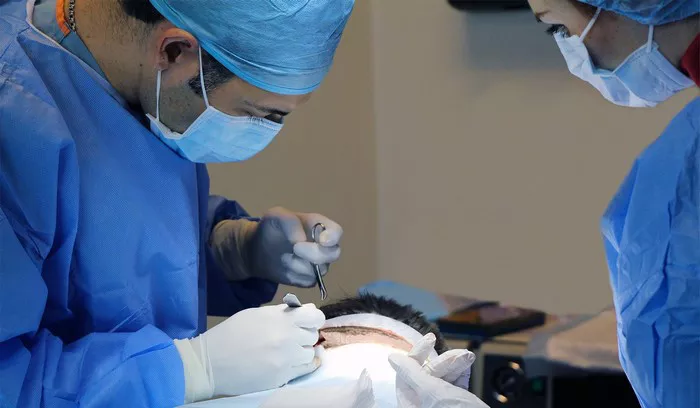Hair transplant surgery has gained significant popularity as a solution for hair loss. While many people experience positive outcomes, it’s natural to have concerns about the recovery process, including numbness in the scalp. This article aims to provide a comprehensive overview of how long head numbness may last after a hair transplant and what factors can influence this sensation.
What is a Hair Transplant?
Before diving into the specifics of numbness, it’s essential to understand what a hair transplant entails.
Types of Hair Transplants
Follicular Unit Extraction (FUE): Involves extracting individual hair follicles from the donor area and implanting them into the thinning or balding areas of the scalp.
Follicular Unit Transplantation (FUT): Involves removing a strip of scalp from the donor area, dissecting it into individual follicles, and transplanting them.
Both methods aim to restore hair density but have different techniques and recovery processes.
See Also: Do You Have to Shave Your Head for a Hair Transplant?
Understanding Numbness After Hair Transplant
Numbness is a common side effect following hair transplant surgery. It occurs due to trauma to the scalp, which can affect the nerves in the area.
Why Does Numbness Occur?
Nerve Damage: The surgical process involves cutting through skin and tissue, which can temporarily damage nerves in the scalp.
Anesthesia: Local anesthesia used during the procedure can cause temporary numbness, which typically subsides as the anesthesia wears off.
Inflammation: Swelling around the surgical sites can put pressure on nerves, contributing to numbness.
How Long Does Numbness Last?
The duration of numbness after a hair transplant can vary widely among individuals, influenced by several factors.
General Timeline
Initial Numbness: Most patients experience numbness immediately after the procedure due to anesthesia. This numbness usually lasts a few hours as the anesthesia wears off.
Short-Term Numbness: Many patients report numbness for a few days to a week post-surgery. During this time, sensations may gradually return to normal.
Long-Term Numbness: In some cases, numbness can persist for several weeks or even months, particularly in areas where the hair follicles were transplanted. This is generally temporary and resolves as nerve function returns.
Average Duration
1-2 Days: Numbness from anesthesia.
1-3 Weeks: General numbness and tingling, gradually improving.
1-6 Months: Residual numbness may linger in some patients but typically improves over time.
Factors Influencing Numbness Duration
Several factors can influence how long numbness lasts after a hair transplant:
1. Individual Healing Factors
Age: Younger individuals often heal faster than older patients.
Health Status: Patients in good health may experience quicker recovery times.
Skin Sensitivity: Individuals with more sensitive skin may experience prolonged numbness.
2. Surgical Technique
Type of Procedure: FUE may cause less trauma and, consequently, less numbness compared to FUT.
Surgeon Skill: Experienced surgeons are less likely to cause significant nerve damage during the procedure.
3. Aftercare Practices
Following Post-Op Instructions: Adhering to the surgeon’s aftercare guidelines can help minimize complications and promote healing.
Avoiding Irritation: Protecting the scalp from irritation, such as tight hats or vigorous scratching, can help prevent prolonging numbness.
4. Complications
Infection: An infection can cause inflammation and prolong numbness.
Nerve Damage: While rare, permanent nerve damage may occur in some cases, leading to extended numbness.
When to Seek Medical Attention
Most cases of numbness after a hair transplant are temporary and resolve on their own. However, it’s essential to monitor your symptoms and seek medical advice if you experience:
Prolonged Numbness: If numbness persists beyond a few months.
Pain or Discomfort: If numbness is accompanied by pain, burning sensations, or other unusual symptoms.
Signs of Infection: Redness, swelling, or pus at the transplant site.
Tips for Managing Numbness
While numbness is generally a temporary side effect, here are some tips to help manage it:
1. Follow Post-Operative Care Instructions
Adhering to the surgeon’s post-operative care guidelines is crucial for minimizing complications.
2. Stay Hydrated
Proper hydration can aid the healing process and support overall health.
3. Avoid Strenuous Activities
Refrain from heavy lifting or strenuous exercise in the initial recovery phase to avoid unnecessary strain on the scalp.
4. Gentle Massage
Once cleared by your surgeon, gently massaging the scalp can help stimulate blood flow and nerve function.
5. Use Cold Compresses
Applying cold compresses can help reduce swelling and discomfort, aiding in recovery.
Conclusion
Numbness after a hair transplant is a common experience that varies among individuals. While most patients can expect to experience temporary numbness for a few days to weeks, some may notice lingering sensations for several months. Understanding the factors that influence numbness duration and following proper aftercare can aid in a smoother recovery process. If you have concerns about numbness or any other post-operative symptoms, don’t hesitate to consult with your healthcare provider. With proper care and attention, you can look forward to the successful outcome of your hair transplant.
You Might Be Interested In
- Can a Hair Transplant Fix Your Hairline?
- When to Remove Scabs After a Hair Transplant: A Complete Guide
- How Are Hair Implants Done? Hair Restoration Techniques


